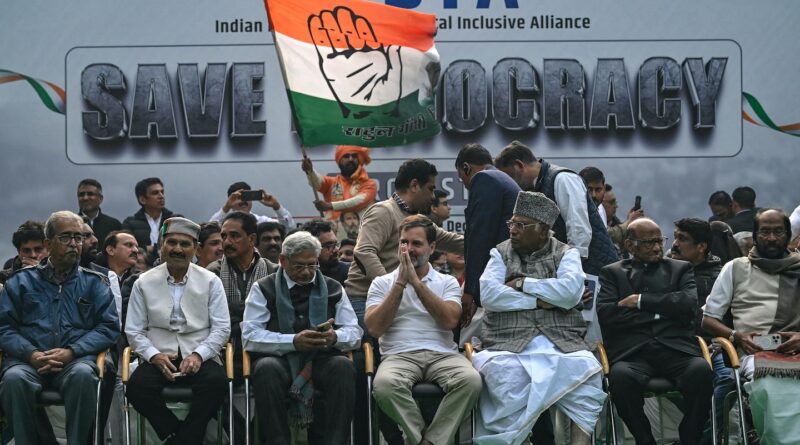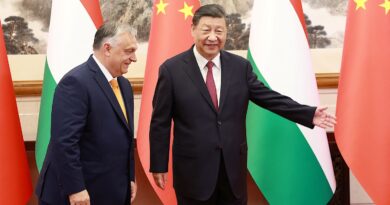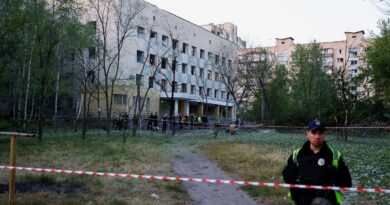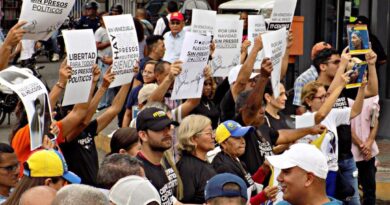India’s opposition rallies against Modi’s rule in effort to ‘save democracy’
The lawmakers were demanding an explanation for a recent security lapse that allowed protesters to infiltrate the legislative building — an issue that authorities refused to address in Parliament. Instead, the Bharatiya Janata Party (BJP) called the actions of the opposition a disruption of parliamentary proceedings and summarily issued suspensions.
With so many of its lawmakers booted from Parliament, a recently formed coalition of 28 opposition parties, known as the Indian National Developmental Inclusive Alliance, or INDIA, took to the streets Friday.
“Modi and Shah have taken it upon themselves to finish democracy in India,” Mallikarjun Kharge, president of the opposition Indian National Congress party, said on stage at the New Delhi protest under a “Save Democracy” banner, referring to Prime Minister Narendra Modi and his powerful home minister, Amit Shah. “They threw out all our [members of Parliament] and passed all the laws unopposed.”
Friday’s protests in New Delhi, the southern city of Hyderabad, and Punjab and Kerala states also served as a kickoff for campaigning ahead of next summer’s national elections.
India’s opposition parties have decried the BJP’s latest actions as yet another abuse of power and capture of state institutions.
In Delhi, thousands of supporters of the opposition parties — whose politics often conflict — gathered waving banners and placards. Ramesh Chandra Sharma, 81, attended with his younger brother to protest Modi’s “dictatorial rule.” Like many in the crowd, though, he was worried about support for the new coalition among average voters and the opposition’s generally poor showings in elections.
“Just this protest today will not be enough,” Sharma said amid the cacophony of voices blaring from giant speakers. “We will have to take to the streets every day. The country’s future is at threat.”
Crucial measures concerning India’s revamped criminal code and the regulation of telecommunication service providers were passed during this session with nearly empty opposition benches and hardly any substantive discussion as a result of the suspensions.
The leaders of both houses of Parliament echoed Modi’s ministers and criticized the opposition for derailing proceedings and holding placards that insulted the prime minister.
Opposition leaders have countered that disrupting proceedings and displaying placards have long been accepted forms of protest in India’s rich parliamentary history. Nearly half of the Parliament’s summer session this year was disrupted by placard-carrying opposition members.
The mass suspensions came after the high-profile expulsion of an opposition member over allegations of receiving money to submit Parliament questions against Gautam Adani, a business tycoon ally of Modi.
In March, Rahul Gandhi, one of the leaders of the opposition Congress party, lost his Parliament membership after a local court convicted him of defaming Modi’s community. Gandhi’s disqualification was later revoked by the Supreme Court.
The latest spate of suspensions centered on a Dec. 13 security breach in which two unarmed civilians jumped from the visitors gallery into Parliament’s lower house and released colored smoke from canisters. Local media revealed that the visitor passes used by the intruders had been issued by a BJP lawmaker, Pratap Simha.
Modi and his home minister, Shah, ignored repeated requests by the opposition to address Parliament about the matter, preferring to talk only to the media about the security breach.
Senior opposition leaders demanded action against the lawmaker who issued the pass for the intruders and accused Modi and Shah — both elected members of the lower house — of mocking India’s democratic institutions by refusing to answer to Parliament.
As tensions between the ruling party and the opposition escalated throughout the week, more and more lawmakers willfully courted suspensions, and the BJP obliged them.
Modi’s style of governing is more like that of a U.S. president than what has previously been done in India’s parliamentary system, according to political scientist Valerian Rodrigues, a former professor at Delhi’s Jawaharlal Nehru University.
“There is a process now taking place wherein the prime minister is made someone who is above the Parliament, rather than being its leader, [by saying] he is not accountable to the legislature,” he said, noting how this approach has been further bolstered by the BJP’s victory in recent state elections. “This is dangerous. It goes against the bigger logic behind … the country’s institutions.”




